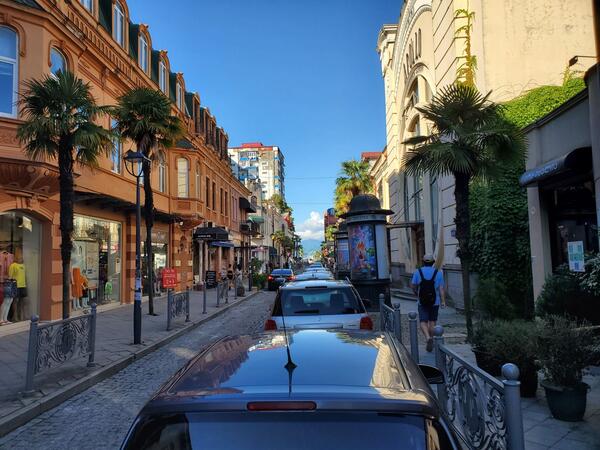
In Batumi, students will live in the best part of the city by the Black Sea with
carefully selected Russophone host families who will provide breakfast and dinner daily. Living conditions will vary, but most apartments will be a walking distance from classes.
Homestays are an integral part of this program. The living arrangements provide participants with the opportunity to learn more about the host culture, increase language proficiency, and form meaningful connections in the community. Students admitted into the program are expected to spend time getting
to know their homestay families and be mindful of the need to balance time spent at home with time exploring the city or going out with friends. If you have any questions about living with a homestay family, we encourage you to reach out to the program director.
to know their homestay families and be mindful of the need to balance time spent at home with time exploring the city or going out with friends. If you have any questions about living with a homestay family, we encourage you to reach out to the program director.
The host families are carefully selected and screened. Most of them have experience in dealing with international students. In addition, as we get closer to our departure, you’ll tell us about your own preferences—i.e., whether you’re a vegetarian or have allergies. A week or so before you arrive, we’ll give you some basic information about the family you’ll be staying with (i.e., their names, ages, professions, emails, and telephone numbers). It’s often a good idea to bring them a small gift (пода́рок), especially something from your university or hometown.
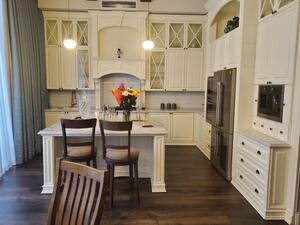
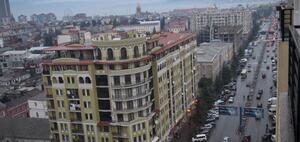
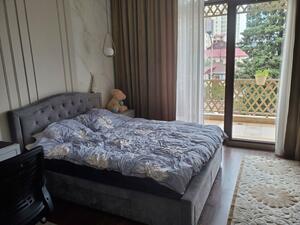
What to bring with you?
Что взять с собой?
While we can’t give you a complete list of things because many of them are a matter of personal preference, below are some suggestions. We’ll talk more about this at the orientation sessions before the departure.
1. A light rain jacket with a hood (e.g., windbreaker, which you can fold and carry with you in your backpack or bag)
2. A light/small umbrella in addition to the windbreaker (for added comfort if, or rather when, it rains)
3. Comfortable walking shoes (more than one pair!!!) since you’ll walk and hike a lot
4. A pair of slippers for wearing in the apartment where you’ll be staying
5. A small “American” gift for your host family (e.g., a t-shirt, calendar, baseball cap, etc.)
6. A few nice/casual outfits for going out. NB: the locals are fashion minded and tend to dress up (rather than down)
7. Shorts and sandals for hot weather
8. A swimsuit since Batumi has a ten-mile-long beach
9. A sweatshirt or a hoodie for cooler days, especially in the mountains
10. A few changes of clothes since you may not be able to do your laundry more often than once per week or so
11. For ladies – one longer skirt (below knees) and a kerchief for touring churches, monasteries, and convents; in Russian Orthodox practice, women aren’t supposed to wear pants and be bareheaded in church; for gentlemen – long pants
12. Everything else you usually take with you when you travel (medications, sunglasses, camera, etc.)
13. Your laptop.
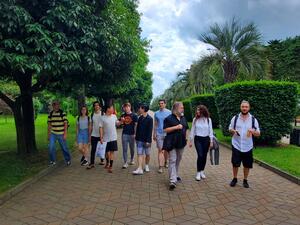
Climate and Weather
Климат и погода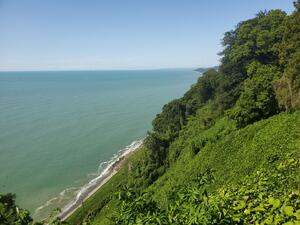
June in Batumi usually is pleasantly warm; rain is likely in the first half of June but it rarely lasts long. The weather usually gets hot by the end of June and stays hot or very hot through the end of the summer. The time you will spend in Tbilisi is likely to be very hot and dry. However, the weather will be cooler in the mountains.
Communications
Связь
The international country code for Georgia is +995.
If you want to call home while you’re in Georgia, you can always use WhatsApp or any other similar service – but you will need to have a reliable internet connection. For that, we provide you with a local SIM card.
Cell Phone
Mобильный телефон
For safety and convenience, you’ll need to have a cell phone with a Georgian cell phone number. This way, you will have the unlimited and reliable Internet service so that your parents and friends could reach you at any moment, you could call a cab or look up any information you need. Moreover, you could easily communicate with program staff and coordinate your movements with fellow students. Therefore, you will need to bring an UNLOCKED US cell phone with you; you don’t want to use your US cell phone in a roaming mode in Georgia – it might be expensive and inconvenient for you to make phone calls within Georgia and have less reliable Internet access. Also, it would be expensive and inconvenient for us, who will be in Georgia, to call you because we’d have to call the US. We will provide you with a Georgian SIM card upon your arrival there.
The latest US models usually come already unlocked. If your cell phone is locked, you may need to call your US cell phone provider and ask them to UNLOCK your US cell phone in order to make it usable for other SIM cards.
If for any reason you cannot unlock your US cell phone, you’ll need to buy or borrow one that works with an alien SIM card.
Money
Деньги
 Шота́ Руставе́ли (the author of The Knight in the Panther’s Skin, 12th century)
Шота́ Руставе́ли (the author of The Knight in the Panther’s Skin, 12th century)In the past, our students spent out of pocket around $500 on average during their five weeks in Georgia. Now, since the entire eight weeks of the program take place in Georgia, this amount is expected to rise accordingly.
What you end up spending depends in large part on the kind of lifestyle you choose to lead when you’re not with our group. Most of your daily needs are already covered by your tuition and fees. Your host families provide you with two meals a day (breakfast and dinner – за́втрак и у́жин), and lunch (обе́д) in town is inexpensive.
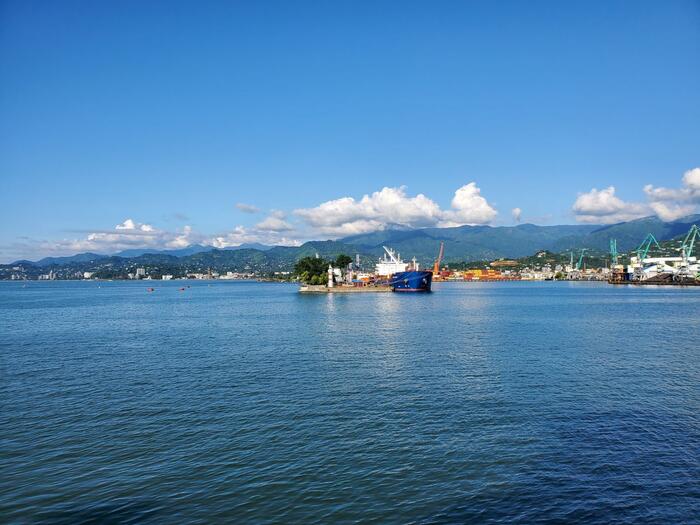
Transportation
Общественный транспорт
Much of Batumi is within walking distance. YandexGo or Bolt rides (Uber equivalents) are also available; they are safe, convenient, and inexpensive ($$2-5 within Batumi) when you download their application on your phone and link your credit card with it. Bicycles are also widely available in Batumi for rides along the 10-mile-long waterfront when you download their application and link your credit card with it. However, the most pleasant way to get around is on foot, so bring comfortable walking shoes!
Many retailers in Georgia take credit cards (креди́тные ка́рточки). Visa and Mastercard are much more commonly accepted than American Express. (Don’t bother bringing your Discover card.) Some credit card companies charge you extra for transactions in foreign currency (about 3%), but some don’t. You need to call them before you leave for Georgia to make sure. You also need to let them know that you’ll be using your credit card or bank card abroad, so they don’t block access for your own security. You should keep your credit card numbers and customer service numbers in a safe place in case you need to cancel them.
ATM machines (банкома́ты) are everywhere in Georgia. If your card is part of the Cirrus, Maestro, Visa, or Mastercard networks (their logos will be on the back of your card), then you can withdraw cash (in lari or dollars) from checking and savings accounts. This is the cheapest and most convenient way to get cash in Georgia. Be sure to check with your bank before you leave to find out what they charge for foreign withdrawals, as well as alert them that you’ll be using your card abroad.
Travelers Cheques (доро́жные че́ки) are useless. Please DO NOT BRING THEM WITH YOU since they are difficult and costly to cash. A standard ATM bank card, a credit card (Visa or MC), and one or two hundred dollars in cash will do.
Health and Safety
Здоровье и безопасность
Batumi is one of the safest places in the world. However, petty crimes still happen, but the local police are reliable and helpful in protecting the public. If you exercise a certain amount of caution, you’ll have a fun, productive, and trouble–free stay there.
Special attention and care should be paid to local traffic, which often appears to be more aggressive than in the US.
You’ll be spending a lot of time in the classroom and on excursions and tours with the whole group. When not, it’s always a good idea to keep us and your host family informed of your whereabouts and plans.
The day after you arrive in Batumi on June 1, 2024, we’ll have our final orientation meeting and discuss these matters in detail.